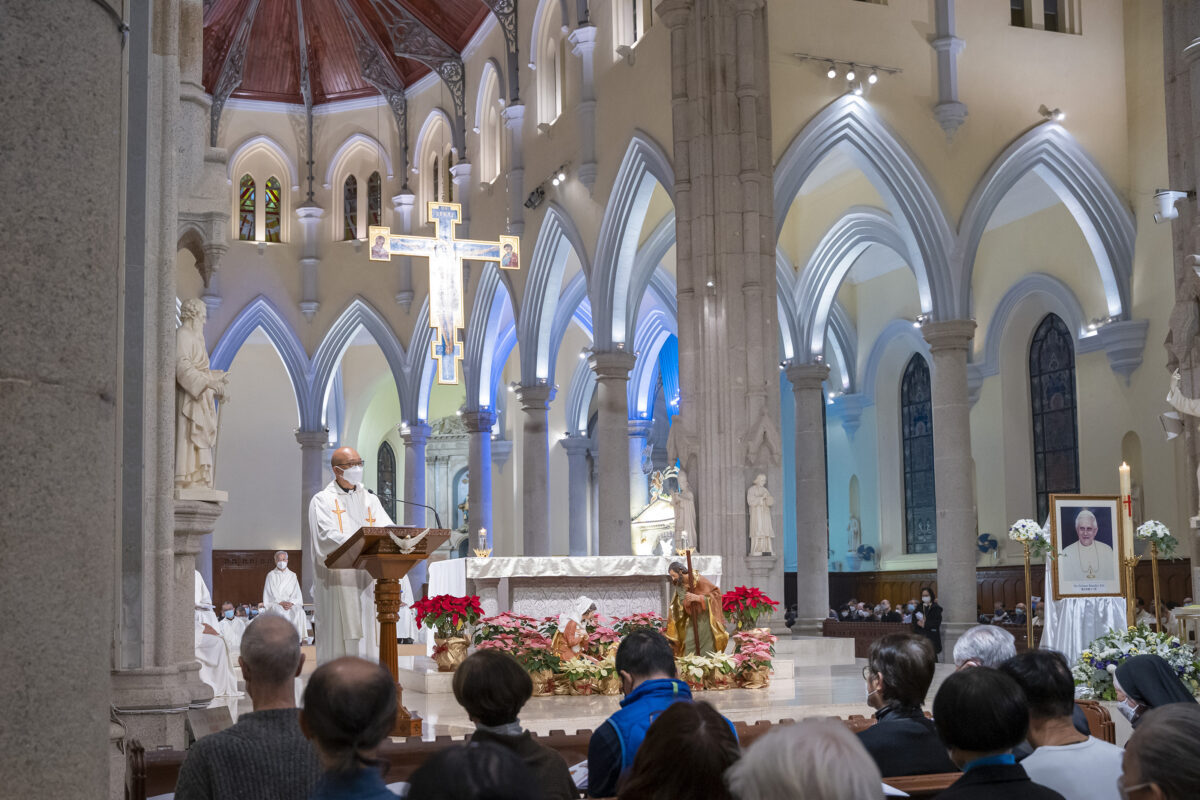Father Peter Choy, VG

Fr Peter Choy, vicar general,
delivered the homily of the Requiem Mass for Pope Emeritus Benedict XVI on 4 January 2023 at the Cathedral of the Immaculate Conception.
He is the Dean of Theology Division of the Holy Spirit Seminary College of Theology and Philosophy and the Director of the Holy Spirit Study Centre.
Below is his homily:
Pope Emeritus Benedict XVI, originally named Joseph Ratzinger, aspired to be a priest since he was a child. He grew up when the Church throughout Europe lost its political influence, and the faith was challenged and questioned by various modern philosophies. There was a closed and apologetic atmosphere in the Church, and the relationship with the world was gradually drifting away. Against this backdrop, Ratzinger entered the seminary, received a theological education that was gradually opening up, and constantly pondered how to revive the meaning of the Church’s faith in a modern context. After graduating, he successfully obtained his teaching qualifications and was employed in several prestigious universities in Germany. Because of his enlightened teaching style and lectures relevant to the times, he soon became a prestigious young professor of theology.
In the 1960s, the Church convened the Second Vatican Council to which he was invited as the personal theological advisor of the Archbishop of Munich. During the conference, he assisted in the drafting and discussion of the conciliar documents, so that he was later hailed as the engineer of the Second Vatican Council, re-outlining the role and service of the Church in the world and setting the direction and blueprint for the future reform of the Church.
After the Second Vatican Council, he was appointed Archbishop of Munich and Fresling and was created a cardinal in 1977. Four years later, Pope St. John Paul II appointed him to head the Congregation for the Doctrine of the Faith of the Holy See, beginning a 24-year collaboration between them.
During his tenure as prefect of the Congregation for the Doctrine of the Faith, he worked hard to implement the spirit of the Second Vatican Council. He advocated mutual respect and dialogue with the world. For example, in 1993, he came to Hong Kong to attend the Federation of Asian Bishops’ Conferences, where he reminded Asian theologians to respect the values of local cultures. Faith and culture must interact equally to produce a truly localized theology. On the other hand, with great courage and at the risk of unpopularity, he calmly pointed out how secular relativism, scientism, and reductionism presuppositions deviated from the Church tradition.
Beginning in the 1960s, he wrote many theological works on all aspects of theology in an open and balanced style. Therefore, many theologians hope to include these writings and put them together into a collection that will be written in the theology of the Church tradition.
In 2005, at the age of 78, Cardinal Ratzinger was elected the 265th Pope of the Church. Ostensibly he no longer had time to juggle academic work, but in fact, he continued to lead the Church, with his usual humility and courage, to reform the Church at the institutional level to meet the challenges of the modern world.
During his short, eight-year pontificate, he confronted the Vatican bank’s mismanagement seriously, and humbly acknowledged the Church’s failure to do its best to protect children from the scandal of clerical abuse. Finally, when he felt weakened and incapable of serving as the Shepherd of the universal Church, he resolutely submitted his resignation in 2013. He established the institution of Pope Emeritus for the Church, becoming a model of nobility, extreme courage and modesty.
Although Cardinal Ratzinger never had the opportunity to visit Hong Kong or set foot in China after becoming pope, his brothers and sisters in the Catholic Church in China are always in his heart. In dealing with the Catholic Church in China, he sent a letter to Chinese Catholics in 2007. In the letter, he pointed out on the one hand, the theological principles and basis of the Holy See in dealing with the problems of the Catholic Church in China. On the other hand, he encouraged the Chinese faithful to promote the normalization of the Catholic Church through dialogue with respect and openness to each other, including relations with the government, with the universal Church, and within the local Church.
“I have competed well; I have finished the race; I have kept the faith.” (1 Timothy 4:6) I believe Pope Emeritus can sum up his life with these words of St. Paul. Although he has served in different positions, such as theologian, prefect of the Congregation for the Doctrine of Faith, and even pope, this is a race to open up to the world at different stages.
In this race, he led the Church through one obstacle after another, responding with openness and humility to the challenges that the world repeatedly sent the Church’s way. Ultimately, he leaves us with a genuine, apostolic faith preserved by courage and fortitude. At the same time, he also leaves us with a wonderful testimony of absolute openness and trust in God, just as Jesus tells Peter in the Gospel of John (21:18) that he would follow Jesus faithfully until the end of his life.
We are here tonight to mourn and to give thanks for the example and legacy left to us by the Pope Emeritus, let us all pray that God may inspire us to carry on our Tradition and strive to emulate the great pope, to discern the signs of the times in our lives with an open attitude and to uphold the integrity of the faith with fortitude.


 ENG
ENG